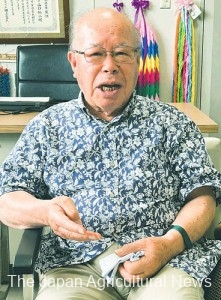NAGASAKI, July 29 — Shigemitsu Tanaka, 84, of the city of Nagasaki, who serves as co-chair of Nobel Peace Prize winner Japan Confederation of A- and H-Bomb Sufferers Organizations, or Nihon Hidankyo, has spoken about the significance of food security based on experiences of food shortages during and after World War II, during an interview with The Japan Agricultural News.
I was four years old when an atomic bomb was dropped on the city of Nagasaki on Aug. 9, 1945. I was deeply shocked and the incident lingers in my memory.
A sudden explosive sound and a blast hit and all the glass windows of the house I was staying were blown out. We had been evacuating to a village where my father grew up. A large number of injured people were accommodated at a school in the village.
The school corridors were filled with a foul odor. Seriously wounded people were lying down inside the classrooms, about 30 in each room. Their burned skin was peeling off and their faces were so swollen that they could hardly open their eyes.
Flies were flying around everywhere and I could hear the constant sound of people groaning. It was hell.
My mother, who had been helping injured people, developed a rash all over her body and suffered from poor health since then.
Nuclear weapons make many people, their families, their descendants and others suffer over a long period of time.
Even after the war ended, we were suffering from severe food shortages. People went to farms to buy food. Farmers wouldn’t sell food in exchange of cash only, so people had to offer things like kimonos and sashes in addition to money and beg them for food.
My father, who returned home after fighting as a soldier, behaved violently to my mother. I believe he resorted to violence because he had experienced coercive control in a military.
When he died, I didn’t feel sad but was relieved. I couldn’t bear watching my mother being beaten and shedding tears.
We were just fortunate that nuclear weapons haven’t been used for the past 80 years. In order to abolish nuclear weapons and war, the most important thing is not to strengthen military capabilities but to educate people.
The preciousness of peace cannot be conveyed without education. To prevent war, it is important for citizens to have interest in politics and social issues and monitor the government. Wars are caused by politics.
I grow vegetables on a small piece of land. Food is vital for the protection of a nation, but I feel it has not been regarded as a high priority.
The term “food security” has frequently been discussed these days, but the discussions sound very shallow to me. Politics that pursue only near-term reduction in rice prices don’t work in any way for consumers or food security.
We should stick to the principle of always producing our food within our country. If we rely on other countries for food, that means we have to do what they tell us to do.
Food was the most crucial in warfare. We should never forget how important food and agriculture is for a country.
During the Pacific War, many young farmers were drafted into military service. Agricultural production capacity dropped and people were starving.
Food is a symbol of peace. Because of climate change and other factors, we are entering an era in which we will no longer be able to get food only if we pay for it.
The agriculture industry cannot thrive only by cutting production costs and accelerating cropland consolidation. Depopulation of rural villages is advancing across Japan and farmlands are abandoned, meaning agriculture is on the verge of collapse. Politics have failed to support sustainable farming in rural villages.
Nihon Hidankyo members believe that the country is facing a new pre-war period. We must once again think seriously about what food security means to us.

Shigemitsu Tanaka was born in Nagasaki Prefecture in October 1940. When the atomic bomb was dropped on the city of Nagasaki, he was staying at his grandfather’s house 6 kilometers away from the hypocenter. He engaged in peace activities when he was a member of a labor union of Japanese National Railways, predecessor of Japan Railways. He currently lives in the city of Nagasaki and grows tomatoes and sweet potatoes. He is a co-chair of Nihon Hidankyo and chairman of the Nagasaki Atomic Bomb Survivors Council.

